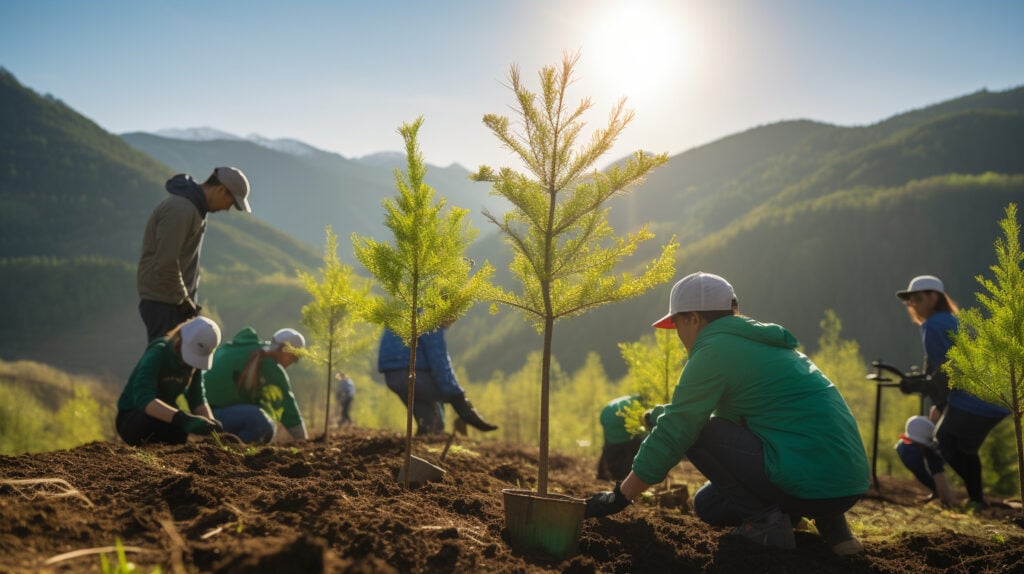Welcome to the world of eco-friendly volunteering! In an era where environmental conservation is of utmost importance, eco-friendly volunteering provides an incredible opportunity to travel responsibly and contribute towards a greener planet. Whether you’re passionate about sustainability, love nature, or simply want to make a positive impact, eco-friendly volunteering is the way to go.
As a friend, I want to guide you through the wonderful world of eco-friendly volunteering. In this article, we will explore the rising interest and value of eco-friendly volunteering, the benefits of corporate volunteering, the age factor in environmental volunteering, and the various opportunities available for sustainable volunteering. We will also delve into the health and social impact of eco-friendly volunteering, the role of technology in this field, and the flexibility and recognition given to volunteers.
So, grab a cup of tea and join me as we embark on a journey to discover the power of eco-friendly volunteering and its impact on our planet and communities. Together, we can make a difference!

The Rising Interest and Value of Eco-Friendly Volunteering
Have you ever considered combining your passion for travel and your love for the environment? Well, you’re not alone! Eco-friendly volunteering, also known as environmental volunteering, is gaining immense popularity among individuals who want to make a positive impact on the planet while exploring new destinations. In this section, we’ll delve into the rising interest and value of eco-friendly volunteering and why it’s an excellent choice for those seeking a meaningful and sustainable travel experience.
Environmental Volunteers: A Growing Community
Environmental volunteers represent a significant portion of the global volunteer community. In fact, they make up approximately 6% of the total volunteer sample worldwide. This demonstrates that more and more people are recognizing the importance of taking action to protect our environment.
Making a Real Difference
The value of eco-friendly volunteering goes beyond personal fulfillment. The volunteer work carried out by environmental enthusiasts is estimated at a staggering US$1.348 trillion, which accounts for around 2.4% of the global economy. This highlights the substantial impact that eco-friendly volunteering has on various sectors, including conservation, sustainability, and community development.
Environmental Volunteering: A Win-Win Situation
Eco-friendly volunteering presents a multitude of benefits not only for the environment but also for the volunteers themselves. Let’s take a closer look at some of these advantages:
- Personal Growth: Immersing yourself in eco-friendly volunteer projects allows you to gain valuable skills, broaden your perspective, and develop a deeper understanding of environmental issues.
- Positive Networking: Engaging in eco-friendly volunteering offers a chance to connect with like-minded individuals and organizations, expanding your network within the environmental community.
- Career Opportunities: Volunteering in environmental projects can open doors to career opportunities in the sustainability sector. Employers often value candidates with hands-on experience and a genuine passion for the environment.
- Travel with a Purpose: Eco-friendly volunteering combines your love for travel with a meaningful purpose. It offers an authentic way to explore new destinations, immerse yourself in local cultures, and create lasting memories.
- Contributing to the Greater Good: The work you do as an environmental volunteer contributes directly to ongoing efforts to combat climate change, protect biodiversity, and promote sustainable practices. You become part of a global movement striving to make the world a better place.
As the interest in eco-friendly volunteering continues to rise, more opportunities are becoming available for individuals of all ages and backgrounds to contribute to a greener planet. So why not embark on an eco-adventure and join the growing community of environmental enthusiasts who are making a real difference in the world?
“Volunteering is the ultimate exercise in democracy. You vote in elections once a year, but when you volunteer, you vote every day about the kind of community you want to live in.” – Unknown

The Age Factor in Environmental Volunteering
Volunteering is a universal activity that people of all ages can participate in, and environmental volunteering is no exception. However, when it comes to environmental volunteering, there is a noticeable age factor that comes into play. Let’s take a closer look at the age demographics of environmental volunteers and what it means for the world of eco-friendly volunteering.
According to research, volunteering in general tends to attract older individuals, and this trend is amplified when it comes to environmental volunteering. In the United Kingdom, for example, the highest rates of volunteering are seen among individuals aged 65 to 74, while the lowest rates are observed among those aged 25 to 34. This suggests that younger individuals may not be as actively involved in environmental volunteering as their older counterparts.
The age factor in environmental volunteering is a crucial topic to consider because it raises questions about the future sustainability of eco-friendly initiatives. As the older generation continues to participate in environmental volunteering, it becomes essential to encourage and engage younger individuals to ensure the longevity and growth of these initiatives.
So why is there a difference in volunteering rates among different age groups? There could be several factors at play:
- Time availability: Older individuals may have more free time since they are retired or have fewer family or work responsibilities. Younger individuals, on the other hand, may be juggling multiple commitments, such as careers, education, and raising a family, leaving them with limited time to volunteer.
- Awareness and education: Environmental volunteering often requires a level of awareness and knowledge about sustainability issues. Older individuals may have had more exposure to environmental issues throughout their lives, while younger individuals may still be learning and developing their understanding of these concerns.
- Motivation and interest: People’s motivations for volunteering can vary based on their personal interests and values. Older generations may have been influenced by a different set of values and priorities, whereas younger individuals may have different passions and causes they are passionate about.
Despite the differences in volunteering rates among age groups, it is important to note that engaging young people in environmental volunteering is crucial for building a sustainable future. Younger individuals bring fresh perspectives, innovative ideas, and a strong desire to make a positive impact on the environment. To bridge the gap and encourage younger individuals to get involved, there are several strategies that can be adopted:
- Education and awareness campaigns: Increasing awareness about environmental issues among younger individuals can help ignite their interest in volunteering. Educational initiatives, workshops, and online resources can provide valuable information and inspire them to take action.
- Partnerships with educational institutions: Collaborating with schools, colleges, and universities can provide opportunities for young people to participate in environmental volunteering as part of their education. By integrating volunteering into the curriculum or offering extracurricular activities, more young individuals can be exposed to the benefits of eco-friendly volunteering.
- Youth-led initiatives: Empowering young people to take the lead in organizing and implementing environmental volunteer projects can create a sense of ownership and motivation. Giving them a platform to voice their ideas and make a difference can be a powerful way to engage them in eco-friendly initiatives.
- Online platforms and technology: Recognizing that young people are often tech-savvy, utilizing online platforms and digital tools can make it easier for them to engage in environmental volunteering. Virtual volunteering options, remote monitoring projects, and interactive apps can provide flexible and accessible opportunities for younger individuals to get involved.
- Collaborative efforts: Bringing different age groups together in environmental volunteering activities can foster intergenerational learning and exchange of ideas. Creating mentorship programs or joint initiatives can help bridge the gap between older and younger individuals, allowing them to learn from each other and work towards a common goal.
The age factor in environmental volunteering is an important consideration for organizations and individuals involved in eco-friendly initiatives. By actively engaging younger individuals and providing them with the necessary support and opportunities, we can ensure the continued growth and success of environmental volunteering efforts, creating a greener and more sustainable planet for generations to come.
Benefits of Corporate Volunteering
Corporate volunteering is a practice in which companies encourage and support their employees to engage in volunteer activities within their communities. This form of volunteering not only benefits the employees and the community, but it also brings valuable advantages to the companies themselves. Here are some of the main benefits of corporate volunteering:
-
Enhanced employee engagement
Employees who participate in employer-sponsored volunteering are five times more engaged at work. By incorporating volunteering opportunities into their corporate culture, companies can boost employee morale and job satisfaction.
-
Improved teamwork and collaboration
Volunteering as a team helps employees develop stronger relationships with their colleagues. When they work together towards a common goal outside of the usual work environment, it fosters a sense of camaraderie and improves teamwork and collaboration skills.
-
Development of leadership skills
Corporate volunteering provides employees with opportunities to take on leadership roles and responsibilities. Whether it’s organizing a volunteer event or leading a team of volunteers, employees can develop and showcase their leadership skills, which can be beneficial for their professional growth.
-
Positive brand image and reputation
Companies that actively engage in corporate volunteering activities gain a positive reputation in the eyes of their employees, customers, and the general public. Being seen as socially responsible and actively contributing to society can enhance a company’s brand image and attract top talent.
-
Increased employee retention
Employees who are engaged in corporate volunteering opportunities are more likely to stay with a company in the long term. Volunteering fosters a sense of loyalty and commitment to the company, leading to higher employee retention rates.
-
Strengthened community relationships
Corporate volunteering allows companies to build strong relationships with local communities. By actively participating in community initiatives and addressing specific needs, companies can demonstrate their commitment to social responsibility and create a positive impact.
-
Skill development and personal growth
Corporate volunteering provides employees with opportunities to develop new skills and gain valuable experiences outside their regular job responsibilities. These new skills can be transferred back to the workplace, contributing to professional growth and personal development.
-
Positive impact on employee health and wellbeing
Engaging in corporate volunteering has been linked to improved mental and physical health. It provides employees with a sense of purpose, fulfillment, and satisfaction, leading to increased overall wellbeing.
In conclusion, corporate volunteering offers a wide range of benefits for both companies and employees. It promotes employee engagement, teamwork, leadership development, and positive brand image. By investing in corporate volunteering initiatives, companies can create a positive impact on employees, communities, and their overall success.

Promoting Sustainable Living and Conservation through Volunteering
Volunteering is not just about giving back to the community, but it’s also an excellent opportunity to promote sustainable living and conservation. By getting involved in eco-friendly volunteering, you can contribute to making the world a greener and healthier place to live. Here are some ways in which volunteering can have a positive impact on sustainable living and conservation:
Influencing Environmentally Friendly Lifestyles
Volunteering can be a powerful tool to influence behavior towards environmentally friendly lifestyles. When you participate in activities that focus on sustainability and conservation, you become more aware of the impact of your actions on the planet. This increased awareness can lead to making conscious choices in your daily life, such as reducing waste, conserving energy, and supporting eco-friendly products.
Hands-on Learning and Data Collection
Volunteering provides hands-on learning opportunities that can deepen your understanding of environmental issues. Whether it’s participating in a clean-up campaign or helping install a shared bike system, you gain practical knowledge about sustainable practices. Additionally, many volunteering programs involve data collection, which contributes to scientific research and helps identify trends and patterns related to environmental conservation.
Increasing Sustainability of a Community
Volunteering can play a vital role in increasing the sustainability of a community. By actively engaging in environmental initiatives, you contribute to projects that aim to create a greener and more resilient community. Whether it’s organizing tree planting events, advocating for renewable energy, or supporting sustainable agriculture, your volunteer work can have a lasting impact on the environment and the well-being of the community.
Volunteering is the ultimate exercise in democracy. You vote in elections once a year, but when you volunteer, you vote every day about the kind of community you want to live in.” – Unknown
Volunteering not only benefits the environment but also has a positive impact on individuals and society as a whole. Let’s explore some of these additional benefits in the next section.
Health and Social Impact of Eco-friendly Volunteering
Volunteering doesn’t just benefit the environment; it can also have a significant impact on your health and well-being. Engaging in eco-friendly volunteering activities can provide numerous physical, mental, and social benefits. Let’s explore how volunteering can improve your health and make a positive change in your community.
Positive Health Benefits
Numerous studies have shown that volunteering can have a positive impact on your health. In fact, almost half of all volunteers report experiencing improved health after engaging in volunteer activities. Here are some of the ways that eco-friendly volunteering can benefit your well-being:
- Reduced stress: Spending time in nature and engaging in environmental activities can help reduce stress levels. Being in green spaces has been shown to have a calming effect on the mind and body.
- Increased physical activity: Many eco-friendly volunteer opportunities involve physical work like planting trees, cleaning up parks, or restoring habitats. These activities promote physical activity, helping you stay fit and active.
- Improved mental well-being: Volunteering has been linked to increased happiness, life satisfaction, and reduced symptoms of depression. Engaging in activities that contribute to the greater good can boost your overall mood and sense of purpose.
- Enhanced cognitive function: Being in nature and participating in eco-friendly volunteering activities can improve cognitive function and concentration levels. It allows for a break from daily routines and provides a refreshing environment for mental clarity and rejuvenation.
Social Impact
Eco-friendly volunteering not only benefits individuals but also has a significant social impact. By participating in environmental initiatives, you become part of a larger community working towards a common goal. Here are some ways volunteering can contribute to the social fabric of a community:
- Building connections: Volunteering brings together people from diverse backgrounds who share a common passion for the environment. It provides an opportunity to meet like-minded individuals and build valuable connections and friendships.
- Fostering community engagement: Volunteering promotes community engagement and strengthens social bonds. By working together towards sustainability, you contribute to the overall well-being of your community.
- Educating and inspiring others: Through your volunteer efforts, you can educate and inspire others to take action towards creating a greener planet. By leading by example, you empower others to make environmentally conscious choices.
Making a Difference
Engaging in eco-friendly volunteering allows you to make a tangible difference in your community and the environment. Whether it’s planting trees, cleaning up beaches, or participating in wildlife conservation projects, every action contributes to a healthier planet. By taking part in these activities, you become an agent of change and an advocate for sustainable living.
As Mahatma Gandhi once said, “Be the change you wish to see in the world.” Volunteering provides a hands-on platform for you to actively contribute towards creating a more sustainable and eco-friendly future.
So, why not incorporate eco-friendly volunteering into your life? Not only will you be helping the environment, but you’ll also enjoy the many health benefits and social connections that come along with it. Get involved, make a difference, and be a part of the positive change our world needs.
“The best way to find yourself is to lose yourself in the service of others.” – Mahatma Gandhi
Technology and Eco-friendly Volunteering
As the world becomes more technologically advanced, it opens up new possibilities for eco-friendly volunteering. Technology can play a crucial role in monitoring the impact of volunteer work and enhancing volunteer engagement. Here, we will explore how technology and eco-friendly volunteering go hand in hand.
Use of data-driven technology
Data-driven technology can be a powerful tool in measuring and monitoring the impact of volunteering efforts. By collecting and analyzing data, organizations can gain insights into the effectiveness of their projects and make data-based decisions to improve their environmental initiatives. For example, using satellite imagery or drones can help in mapping deforestation areas and tracking progress in reforestation projects.
Investing in technology infrastructure
Organizations that aim to promote eco-friendly volunteering can benefit from investing in technology infrastructure. This includes providing volunteers with access to digital tools and resources that can enhance their volunteer experience. For example, having a dedicated volunteer management system can streamline communication between volunteers and organizations, making it easier to coordinate efforts and share information.
Furthermore, technology infrastructure can enable remote volunteering opportunities, allowing volunteers to contribute to environmental initiatives from anywhere in the world. This can be particularly valuable for those who may not have the means to travel or participate in on-site volunteering.
Harnessing the power of social media
Social media platforms have become powerful tools for promoting eco-friendly volunteering and raising awareness about environmental issues. Volunteers can use social media to share their experiences, inspire others to get involved, and educate their networks about sustainable living practices. Organizations can also leverage social media to recruit volunteers, share updates on their projects, and engage with a wider audience.
Virtual reality and augmented reality
Virtual reality (VR) and augmented reality (AR) technologies are revolutionizing the way we experience and understand the world. These immersive technologies can be used to create virtual simulations of environmental challenges and educate volunteers about the importance of sustainable practices. For example, VR can transport volunteers to endangered ecosystems, allowing them to see firsthand the impact of pollution and climate change.
AR can also be used to provide volunteers with real-time information about their surroundings during fieldwork, making their efforts more efficient and effective. By harnessing the power of VR and AR, eco-friendly volunteering can become an even more engaging and impactful experience.
The role of mobile apps
Mobile apps have become essential tools in various aspects of our lives, and eco-friendly volunteering is no exception. There are several apps available that can help volunteers find and join environmental projects, track their progress, and connect with like-minded individuals. These apps can also provide educational resources, tips for sustainable living, and ways to get involved in advocacy campaigns.
With the convenience of mobile apps, volunteers can easily access information and resources on the go, making their participation in eco-friendly volunteering more accessible and user-friendly.
In conclusion, technology plays a crucial role in the realm of eco-friendly volunteering. From data-driven technology to social media platforms, virtual reality, and mobile apps, technology enhances the impact and reach of volunteer efforts. By harnessing the power of technology, we can create a more sustainable and greener future for our planet. So, let’s embrace technology and use it as a tool for positive change through eco-friendly volunteering!
Sustainable Volunteering Opportunities
Are you looking for ways to make a positive impact on the environment while experiencing incredible adventures? Sustainable volunteering offers the perfect opportunity to travel responsibly and contribute to a greener planet. Whether you’re passionate about conservation, sustainable fashion, or reducing waste, there are numerous volunteering opportunities available that align with your interests. Here are some sustainable volunteering opportunities that you can explore:
1. Planting Trees
Forests play a crucial role in combating climate change and preserving biodiversity. Join tree-planting initiatives that aim to restore deforested areas or create urban green spaces. Planting trees not only helps to sequester carbon dioxide but also provides habitats for wildlife.
2. Hosting Clean-ups
With the rise in plastic pollution and waste, organizing clean-up events can have a significant impact on the environment. Join local groups or organizations that conduct beach clean-ups, park clean-ups, or river clean-ups. By collecting and properly disposing of litter, you’re not only beautifying the area but also preventing harm to marine life and wildlife.
3. Animal Shelters
Volunteering at animal shelters is a great way to support animal welfare and conservation. You can assist in taking care of rescued animals, promoting adoption, or even participating in wildlife rehabilitation programs. By providing a safe and loving environment for animals, you play a vital role in their well-being.
4. Food Waste Warriors
Food waste is a significant contributor to greenhouse gas emissions. Join organizations that work towards reducing food waste by collecting excess food from restaurants, hotels, and events and redistributing it to those in need. By volunteering as a food waste warrior, you’re not only reducing food waste but also helping to alleviate hunger in your community.
5. Environmental Conservation Projects
Contribute to the preservation of natural habitats and ecosystems by volunteering for environmental conservation projects. These projects may involve restoring wetlands, monitoring endangered species, or conducting research on ecosystem health. By actively participating in conservation efforts, you’re directly involved in safeguarding our planet’s natural beauty.
6. Sustainable Fashion Initiatives
If you have a passion for fashion and sustainability, consider volunteering with organizations that promote sustainable fashion. Help raise awareness about the environmental impact of the fashion industry and support initiatives that encourage ethical and eco-friendly practices. You can get involved in clothes swaps, upcycling workshops, or sustainable fashion events.
7. Sustainable Mobility Task Forces
Transportation is a significant contributor to greenhouse gas emissions. Join sustainable mobility task forces that focus on promoting eco-friendly transportation options such as cycling, walking, and public transit. You can assist in organizing bike-sharing programs, advocating for pedestrian-friendly infrastructure, or educating the community about sustainable commuting alternatives.
These are just a few examples of the diverse sustainable volunteering opportunities available. Remember, the key is to find a cause that resonates with you and matches your skills and interests. By dedicating your time and energy to sustainable volunteering, you not only contribute to a greener planet but also gain a deeper understanding of the environmental challenges we face.
“Volunteer work is the ultimate exercise in democracy. You vote in elections once a year, but when you volunteer, you vote every day about the kind of community you want to live in.” – Author Unknown
So, why wait? Start your sustainable volunteering journey today and be a part of the positive change our planet needs.
Flexibility and Recognition of Volunteer Work
When it comes to eco-friendly volunteering, flexibility and recognition are two key factors that can greatly enhance the experience of volunteers. Let’s explore how flexibility and recognition play a crucial role in making volunteer work more accessible and rewarding for individuals:
Flexibility Gives Volunteers More Options
One of the great things about eco-friendly volunteering is that there are various options available for individuals with different lifestyles and schedules. Flexibility allows volunteers to find opportunities that align with their interests, skills, and availability. Here are some ways in which flexibility is incorporated into eco-friendly volunteering:
- Virtual and Hybrid Volunteering: In today’s digital age, it’s easier than ever to make a positive impact from the comfort of your own home. Virtual volunteering allows individuals to contribute their skills and expertise remotely, while hybrid volunteering options combine in-person and virtual elements.
- Flexible Time Commitments: Many eco-friendly volunteer programs offer flexibility in terms of time commitment. You can choose to volunteer for a few hours a week, a few days a month, or even go on longer-term volunteer trips. This flexibility makes it easier for individuals to fit volunteering into their busy lives.
Recognition is Key
Recognizing the efforts of volunteers is essential for fostering a strong sense of fulfillment and motivation. When volunteers feel appreciated and valued, it encourages them to continue their eco-friendly volunteering journey. Here are some ways in which recognition can be shown to volunteers:
- Gestures of Appreciation: A simple “thank you” can go a long way in recognizing the efforts of volunteers. Organizations can also consider offering small tokens of appreciation such as event merchandise or free tickets to shows or exhibitions related to the cause.
- Certificates and Awards: Recognizing volunteers through certificates or awards can be a meaningful way to acknowledge their dedication and contribution. These can be presented at volunteer appreciation events or shared online with the wider community.
- Sharing Success Stories: Highlighting the impact that volunteers have made through success stories and testimonials can be a powerful way to recognize their efforts. This can be done through social media, newsletters, or even hosting events where volunteers can share their experiences.
The Benefits of Flexibility and Recognition
Both flexibility and recognition contribute to a positive volunteer experience and have several benefits for individuals and organizations alike. Here’s why they are important:
- Enhanced Engagement: Flexibility allows volunteers to choose opportunities that align with their interests and availability, resulting in higher engagement and commitment.
- Improved Retention: When volunteers feel recognized and appreciated, they are more likely to continue their involvement in eco-friendly volunteering. This leads to better retention rates, ensuring the continuity of valuable volunteer work.
- Attraction of Diverse Volunteers: Offering flexible options and recognizing volunteers from different backgrounds and age groups can attract a diverse range of individuals to get involved in eco-friendly volunteering. This promotes inclusivity and brings fresh perspectives to the cause.
- Positive Public Image: Recognizing and celebrating the work of volunteers not only boosts their morale but also enhances the public image of the organization. It signals to potential volunteers and supporters that the organization values and appreciates those who contribute their time and efforts.
In conclusion, flexibility and recognition are vital aspects of eco-friendly volunteering. They provide volunteers with options that suit their lifestyles and commitments while ensuring that their efforts are acknowledged and valued. By incorporating these elements into volunteer programs, organizations can create a more inclusive, fulfilling, and impactful experience for volunteers, ultimately contributing to a greener and more sustainable planet.
Families and Environmental Volunteering
Introduction
Getting involved in environmental volunteering as a family is not only a great way to spend quality time together but also an opportunity to teach children about the importance of protecting the planet. Engaging in activities that promote sustainable living and conservation can have a lasting impact on children, instilling in them a sense of responsibility towards the environment. In this section, we will explore the benefits and opportunities for families to participate in environmental volunteering.
Benefits of Family Volunteering
Engaging in environmental volunteering as a family can bring a wide range of benefits, including:
- Bonding time: Volunteering allows families to spend quality time together, strengthening bonds and creating lasting memories.
- Teaching responsibility: By participating in environmental initiatives, parents can teach their children the importance of taking care of the environment and being responsible global citizens.
- Hands-on learning: Volunteering provides hands-on learning opportunities for children to understand environmental issues and see the impact of their actions.
- Building empathy: Volunteering exposes children to different people and communities, helping them develop empathy and understanding of diverse perspectives.
- Instilling values: Volunteering as a family can instill values such as compassion, empathy, and environmental stewardship in children from an early age.
Family Volunteering Opportunities
There are numerous environmental volunteering opportunities suitable for families. Here are some examples:
- Beach clean-ups: Participate in organized beach clean-up events to remove litter and plastic waste from shorelines, helping to protect marine life.
- Community gardens: Volunteer at a local community garden where families can work together to grow organic vegetables and promote sustainable food production.
- Nature trail maintenance: Help maintain and preserve hiking trails in national parks or local nature reserves by clearing debris and maintaining signage.
- Tree planting: Join reforestation projects where families can plant trees together, contributing to carbon sequestration and habitat restoration.
- Wildlife conservation: Volunteer at animal shelters or wildlife sanctuaries to assist with caring for animals and raising awareness about conservation efforts.
- Educational workshops: Organize environmental education workshops where families can learn about topics such as climate change, recycling, and sustainable living.
Tips for Family Volunteering
To ensure a successful and enjoyable volunteering experience as a family, here are some tips to keep in mind:
- Research opportunities: Look for volunteering opportunities that are suitable for different age groups and align with your family’s interests and values.
- Plan ahead: Coordinate with the organization or event organizers beforehand to understand the requirements, schedules, and necessary preparations.
- Set expectations: Discuss the purpose and goals of the volunteering activity with your children, explaining why it is important and what impact they can make.
- Safety first: Ensure the safety of every family member by following safety guidelines and using appropriate protective gear when necessary.
- Reflect and discuss: After the volunteering activity, encourage discussions with your children about what they learned, the impact of their actions, and how they can continue to make a difference in their daily lives.
Conclusion
Family volunteering offers a unique opportunity for parents and children to make positive change together while building strong family bonds. By participating in environmental volunteering activities, families can contribute to a greener planet, educate their children about environmental issues, and instill values that will shape their attitudes towards sustainability for years to come. So, gather your loved ones and embark on an eco-friendly volunteering adventure that will leave a lasting impact on the planet and your family’s memories.
Addressing Water Pollution and Energy Matters through Volunteering
Water pollution and energy consumption are two major environmental challenges that the world is facing today. Fortunately, there are various ways in which individuals can contribute to addressing these issues through volunteering. By dedicating our time and efforts to volunteer work focused on water pollution and energy matters, we can make a significant difference in creating a greener and more sustainable planet. Here are some ways in which volunteering can help tackle these challenges:
Blue-green algae monitoring and clean lake initiatives
- Water pollution, especially caused by blue-green algae blooms, is a serious concern for many bodies of water around the world.
- Volunteering in blue-green algae monitoring programs allows individuals to contribute to the early detection of harmful algal blooms.
- By monitoring water quality and collecting data, volunteers can help scientists and researchers better understand the causes and impacts of these blooms, leading to effective management strategies.
- Clean lake initiatives involve activities such as removing litter, debris, and pollutants from lakes and their surrounding areas.
- Volunteering in clean lake initiatives helps restore and preserve the health of aquatic ecosystems, ensuring clean and safe water for both humans and wildlife.
Geothermal heating initiatives
- Energy consumption contributes significantly to climate change. By volunteering in geothermal heating initiatives, individuals can actively participate in promoting sustainable energy solutions.
- Geothermal energy is an eco-friendly alternative to traditional fossil fuel-based heating systems.
- Volunteering in geothermal heating initiatives can involve activities like advocating for the adoption of geothermal systems, assisting in the installation and maintenance of geothermal heating systems, or educating communities about the benefits and process of geothermal energy.
- By actively supporting geothermal heating, individuals can reduce carbon emissions and promote the use of renewable energy sources.
Volunteering in water pollution and energy matters not only benefits the environment but also has social and personal advantages. Here are some additional reasons why getting involved in these causes can make a positive impact:
- Community Engagement: Volunteering allows individuals to connect and engage with their communities, working together towards a common goal of environmental sustainability.
- Education and Awareness: Through volunteering, individuals can learn more about water pollution, energy consumption, and their impact on the environment. This knowledge can be shared with others, raising awareness and inspiring more people to take action.
- Personal Growth: Volunteering provides opportunities for personal growth and skill development. Volunteers can learn new techniques, gain hands-on experience, and develop leadership abilities, all while contributing to important environmental causes.
- Building Networks: Volunteering brings people together, creating networks of individuals passionate about environmental conservation. These networks can offer support, collaboration, and ongoing opportunities to make a difference.
Together, we can address water pollution and energy matters through volunteering. By actively participating in initiatives focused on these issues, we not only contribute to the preservation of our environment but also inspire others to take action. Let’s make a positive impact and create a greener and more sustainable future for generations to come.
Preserving Natural Areas Through Volunteering
If you’re passionate about nature and want to make a real difference in preserving natural areas, volunteering is an excellent way to get involved. By dedicating your time and energy, you can contribute to the conservation and restoration of our precious ecosystems. Volunteering not only allows you to immerse yourself in the beauty of nature but also provides an opportunity to connect with like-minded individuals who share your love for the environment.
Restoring Habitats, Picking up Trash, and Planting Wildlife-Friendly Vegetation
One of the most impactful ways to preserve natural areas is by participating in habitat restoration projects. These projects involve tasks such as removing invasive species, planting native vegetation, and creating habitats for local wildlife. By doing so, you’re helping to restore the balance in ecosystems and ensure the survival of various plant and animal species.
Another essential aspect of preserving natural areas is keeping them clean and free from pollution. Organizing clean-up events in parks, beaches, or hiking trails not only improves the aesthetic appeal of these areas but also safeguards the well-being of wildlife. Litter can have severe consequences on animals, causing injury or even death when they mistake it for food or become entangled in it. By picking up trash, you’re actively preventing harm and preserving the natural beauty for everyone to enjoy.
Contributing to Natural Area Conservation
In addition to habitat restoration and clean-up initiatives, there are numerous other ways you can contribute to the conservation of natural areas through volunteering:
- Educational Programs: Sharing knowledge and raising awareness about the importance of preserving natural areas is key to creating long-term change. By volunteering as an educator, you can teach visitors about sustainability, ecosystem protection, and the significance of biodiversity.
- Trail Maintenance: Maintaining trails in natural areas is crucial for ensuring safe and accessible routes for hikers and outdoor enthusiasts. Volunteering to repair and maintain trails helps to prevent erosion, protect fragile ecosystems, and promote responsible outdoor activities.
- Wildlife Monitoring: Participating in wildlife monitoring programs allows you to collect data on species populations, behavior, and habitat use. This information helps scientists and conservationists make informed decisions regarding wildlife protection and management.
- Prescribed Burns: Controlled burns are essential for promoting the growth of native vegetation, reducing the risk of wildfires, and maintaining healthy ecosystems. Volunteers trained in prescribed burn techniques can assist in safely executing these burns under the supervision of professionals.
Making a Lasting Impact
Preserving natural areas through volunteering not only benefits the environment but also provides personal fulfillment and a sense of accomplishment. By contributing your time and skills, you’re actively participating in the conservation of our planet’s natural resources for future generations to enjoy. Through your efforts, you will help maintain the delicate balance of our ecosystems and protect the biodiversity that makes these areas so unique.
So, if you’re passionate about nature and want to play a role in conserving natural areas, consider volunteering your time. Whether you choose to restore habitats, pick up trash, or contribute in other ways, your efforts will have a lasting impact, leaving a positive footprint on our planet. Take the first step today and make a difference in preserving our natural areas for generations to come.
“The Earth does not belong to us; we belong to the Earth.” – Chief Seattle
Conclusion
In conclusion, eco-friendly volunteering is not only a fulfilling way to travel and make a positive impact on the world, but it also offers numerous benefits to volunteers and the communities they serve. By choosing to engage in environmentally conscious volunteer work, individuals can contribute to the preservation of natural areas, promote sustainable living, address water pollution and energy matters, and make a significant difference in the fight against climate change.
Through volunteering, individuals of all ages can gain valuable hands-on experience, develop new skills, and create lifelong memories. Eco-friendly volunteering also provides opportunities for personal growth, social impact, and improved mental and physical health. The rising interest in eco-friendly volunteering reflects a growing awareness of the need to protect our planet and create a greener future.
At A Broader View Volunteers, we are committed to promoting eco-friendly volunteering and providing meaningful, life-changing experiences for volunteers. With our global network and wide range of sustainable projects, we offer opportunities for individuals to make a lasting impact while immersing themselves in different cultures and communities.
Whether you are interested in planting trees, hosting clean-ups, working with animal shelters, or participating in environmental conservation projects, there are countless opportunities to get involved and contribute to the betterment of our planet.
By harnessing the power of technology and embracing innovative approaches, we can enhance the impact of eco-friendly volunteering and ensure the sustainability of our initiatives. Investing in data-driven technology and infrastructure can help monitor and quantify the impact of volunteer work while engaging more individuals in the cause.
Families can also play a crucial role in environmental volunteering, as it promotes engagement, bonding, and the development of environmental consciousness among younger generations. Family volunteer vacations offer the opportunity to create lifelong memories while making a positive difference together.
In recognition of the valuable contributions made by volunteers, it is important to provide flexibility and recognition. Virtual and hybrid volunteering options allow individuals to contribute at their own pace and convenience, while gestures such as offering event merchandise or free tickets can show appreciation and encourage continued engagement.
As we continue to face environmental challenges, the importance of eco-friendly volunteering cannot be overstated. It is through the collective efforts of individuals, organizations, and communities that we can create a greener, more sustainable planet for future generations.
To explore our eco-friendly volunteering opportunities and make a difference, visit A Broader View Volunteers at www.abroaderview.org. Together, let’s travel responsibly and contribute to a greener planet.
Remember, every small action counts, and by volunteering, you can be part of the solution.
“Volunteering is the ultimate exercise in democracy. You vote in elections once a year, but when you volunteer, you vote every day about the kind of community you want to live in.” – Unknown.
Frequently Asked Questions
- What is eco-friendly volunteering?
Eco-friendly volunteering refers to participating in volunteer projects and activities that have a positive impact on the environment, promote sustainability, and contribute to a greener planet.
- Why is eco-friendly volunteering important?
Eco-friendly volunteering is important as it allows individuals to actively contribute to environmental conservation, raise awareness about sustainability issues, and make a positive impact on local communities and ecosystems.
- What are some popular eco-friendly volunteering opportunities?
There are many popular eco-friendly volunteering opportunities, including tree planting initiatives, wildlife conservation projects, beach cleanups, sustainable agriculture programs, and renewable energy development projects.
- How can I find eco-friendly volunteering projects?
To find eco-friendly volunteering projects, you can search on reputable volunteering platforms, visit environmental organizations’ websites, or join eco-conscious communities that share information about volunteering opportunities.
- What are some tips for traveling responsibly during eco-friendly volunteering?
Some tips for traveling responsibly during eco-friendly volunteering include choosing environmentally-friendly transportation options, minimizing waste and plastic usage, respecting local communities and cultures, and supporting local sustainable businesses.
-
Safe Solo Volunteering Abroad | Empowerment FemalesThrough Service with ABV

Embrace the adventure of a lifetime with ABV’s supported solo volunteering programs. Create lasting friendships, make a real difference, and explore the world safely under a supportive umbrella. Recommend Peru, Ecuador, Colombia, and more. Table of Contents Introduction to ABV and Solo Volunteering Traveling solo can be a thrilling yet daunting endeavor. A Broad View…
-
Empowerment Through Sustainable programs: Volunteer Opportunities in Peru Cusco

Discover empowering volunteer opportunities in Peru Cusco with www.abroaderview.org. Support sustainable programs and make a positive impact while gaining valuable experiences.
-
Midwives & Obstetricians: Empower Mothers & Babies Abroad

Discover how midwives and obstetricians from abroad can empower mothers and babies through the programs offered by www.abroaderview.org. Make a difference today.



